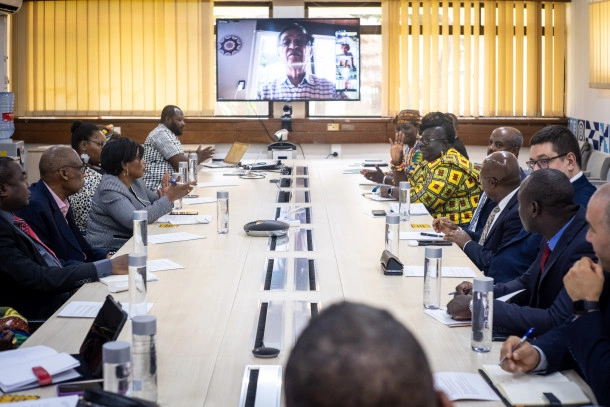The UNESCO office in Accra and the South-South Cooperation Council for Sustainable Development (SSCC) recently organized a pivotal meeting and consultation in Accra, Ghana. Bringing together African Ambassadors and key stakeholders, the event focused on “Culture of Peace and Security in Africa: The Quest for Stewardship and Cooperative Engagement”. The meeting provided a unique platform for participants to share their insights, experiences, and strategies for harnessing the potential of culture to promote peace and security in Africa.
In his opening remarks, Mr. Viktor Sebek, Chairman of the SSCC, underscored the critical importance of exploring how culture can contribute to peace processes in Africa, highlighting the SSCC’s projects, such as the docufiction film Ulysses from Ghana which focus on the struggle against racism and discrimination, which was screened in UNESCO and contributed to the inauguration of UNESCO’s second edition of the Global Forum against Racism and Discrimination.

Diverse Perspectives on the Role of Culture
Over 15 African countries were represented at the event, including notable attendees such as H. E. Pingrenoma Zagré, Ambassador of Burkina Faso and Dean of the Diplomatic Corps; and Mr. Zakaria El Miri, First Secretary of the Kingdom of Morocco representing the Ambassador H.E Imane Quaadil who is the Dean of the African Ambassadors. Other esteemed participants included H. E. Claudia Turbay, Former Ambassador of Colombia to Ghana and former Dean of the Diplomatic Corps; Mr. Abdourahamane Diallo, UNESCO Representative in Ghana; Madam Edna Nyame, Executive Director of the National Commission for Culture; and Hon. Kojo Yankah, Founder of African University College of Communication.
The discussions highlighted the importance of culture as a driving force for unity, social cohesion, and sustainable development in Africa. Participants emphasized the need for governments to prioritize cultural initiatives and invest in the creative sector to reduce poverty and empower young people.
Mr. Zakaria El Miri emphasized the importance of recognizing Africa’s long history of interregional interactions and cultural exchange. He shared his concerns about the tendency to view African countries and regions as isolated bubbles, which hinders broader cultural development. He cited the example of traditional Moroccan music that can be traced back to Ghana, demonstrating the historical connections between Northern and West Africa, and how this rich cultural heritage has been shaped by migration and the blending of traditions.

Mr. Abdourahamane Diallo, UNESCO representative in Ghana, underscored the importance of intergenerational dialogue in fostering understanding and reducing the potential for conflict. He noted that digital spaces can both promote and exacerbate cultural misunderstandings and called for greater attention to this issue.
H.E. Pingrenoma Zagré stressed the importance of addressing the root causes of terrorism and violent extremism, acknowledging that misunderstandings among the youth often contribute to these issues. He observed that many of these young people have not been exposed to core values of life and social issues due to a lack of education. Ambassador Zagré emphasized the importance of addressing these problems starting from the family level and expressed optimism about learning from those at the forefront of research to effectively combat these challenges.
Examples of Successful Cultural Initiatives
Several key initiatives and collaborations were highlighted during the meeting, illustrating the power of culture in promoting peace and security. One such initiative was the Pamoja Festival in Kenya, which aims to bring people together and enhance unity in the country and the region. The festival fosters dialogue on the effects of various challenges while promoting cultural exchange and understanding.
Ms. Beverly Moss Koech, Secretary of Peace Building and Conflict Management in the Office of the President in Kenya, discussed a program called Evidence and Lessons from Latin America (ELLA) aimed at crime and violence prevention. The program, customized for Kenya, engaged youth with criminal backgrounds in the coastal regions of Kuala and Kilifi. Remarkably, these youth formed a dance group to express themselves, spread peace, and address issues like drug abuse, unemployment, and radicalization through song and dance. The dance group has facilitated exposure, acceptance, and reintegration into society, and the success of this initiative has led to plans for replicating it in different counties.
In Togo, the government has established a Ministry supporting young entrepreneurs and artists. The country has also created the House of Youth, a space where young people can exchange ideas and collaborate on projects in various regions. Moreover, Togo’s government supports women in rural communities through financial inclusion programs and provides assistance to the agricultural sector.
One of the central themes of the meeting was the potential of cultural exchange to create economic value for young people in Africa and promote a sense of cultural identity. An example of this was the Mansa Musa World Project, a series of spectacular African theatrical productions focusing on the rich cultural heritage of the continent by the Ghanaian creative and playwright Chief Moomen.
Another key collaboration mentioned was the partnership between the African Union, Angola, and UNESCO for the biannual “Culture of Peace” event, set to take place in Luanda in November. The event will focus on promoting peace and security across the continent and fostering unity among the six regions of Africa.
Moving Forward: A Call for Collaboration and Action
In her closing remarks, Ms. Johanna Kouzmine-Karavaïeff, researcher, cultural specialist, member of the SSCC Academic & Scientific Board, stressed the need for African countries to work together and complement each other’s efforts. She highlighted the potential pitfalls of competition and parallel initiatives and called for a more collaborative approach.
H. E. Claudia Turbay expressed her commitment to continuing support for African countries, particularly Ghana. She emphasized the importance of cultural diplomacy in promoting peace and security, citing gastronomy as an example of how different cultures can come together to create dialogue. She shared news of the upcoming celebration of Afro descendant days in Colombia, highlighting Colombia’s ongoing efforts to strengthen its relationship with Africa and work together towards a common goal of fostering peace and unity through cultural diplomacy.

The African Ambassadors’ meeting in Accra demonstrated a strong commitment to harnessing the power of culture for peace and security in Africa. The event emphasized the importance of collaboration, intergenerational dialogue, and the prioritization of cultural initiatives. As African nations continue to work together and share their experiences, the power of culture to promote peace, security, and sustainable development will become increasingly apparent.
Source: unesco




















Add Comment